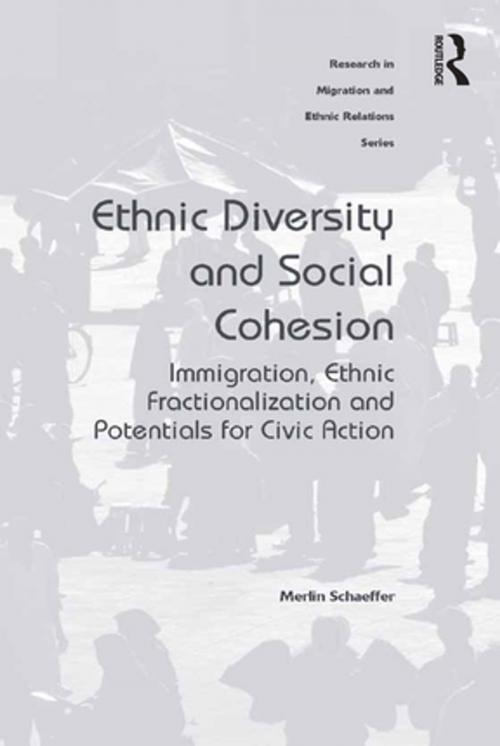Ethnic Diversity and Social Cohesion
Immigration, Ethnic Fractionalization and Potentials for Civic Action
Nonfiction, Social & Cultural Studies, Social Science, Cultural Studies, Emigration & Immigration, Ethnic Studies| Author: | Merlin Schaeffer | ISBN: | 9781317140948 |
| Publisher: | Taylor and Francis | Publication: | May 23, 2016 |
| Imprint: | Routledge | Language: | English |
| Author: | Merlin Schaeffer |
| ISBN: | 9781317140948 |
| Publisher: | Taylor and Francis |
| Publication: | May 23, 2016 |
| Imprint: | Routledge |
| Language: | English |
Exploring the debate within social sciences on the consequences of ethnic diversity for social cohesion and the production of public goods, this book draws on extensive survey data from Germany to engage with questions surrounding the relationship between ethnic diversity and issues such as welfare provision and the erosion of public trust and civic engagement in Europe. It moves away from the question of whether there is in fact a universal correlation between ethnic diversity and social cohesion in order to focus on the reasons for which people's reciprocity and trust might be reduced in more ethnically diverse areas. Drawing attention to the importance of peoples' perceptions of diversity in explaining levels of social cohesion, Ethnic Diversity and Social Cohesion shows how specific types of perceived diversity can help explain the reasons for which ethnic diversity is associated with declines in social cohesion, and the contexts and conditions in which this occurs. The book also outlines potential courses of action, revealing the important roles of residential segregation, children and interethnic partners in overcoming barriers of language, values and cognitive bias. A rigorous, timely study of ethnic diversity and its relation to liberal democracy as a form of deliberative conflict that requires certain levels of trust, shared values and engagement, Ethnic Diversity and Social Cohesion will be of interest to policy makers, sociologists and political scientists working in the fields of race and migration, ethnic diversity and community cohesion.
Exploring the debate within social sciences on the consequences of ethnic diversity for social cohesion and the production of public goods, this book draws on extensive survey data from Germany to engage with questions surrounding the relationship between ethnic diversity and issues such as welfare provision and the erosion of public trust and civic engagement in Europe. It moves away from the question of whether there is in fact a universal correlation between ethnic diversity and social cohesion in order to focus on the reasons for which people's reciprocity and trust might be reduced in more ethnically diverse areas. Drawing attention to the importance of peoples' perceptions of diversity in explaining levels of social cohesion, Ethnic Diversity and Social Cohesion shows how specific types of perceived diversity can help explain the reasons for which ethnic diversity is associated with declines in social cohesion, and the contexts and conditions in which this occurs. The book also outlines potential courses of action, revealing the important roles of residential segregation, children and interethnic partners in overcoming barriers of language, values and cognitive bias. A rigorous, timely study of ethnic diversity and its relation to liberal democracy as a form of deliberative conflict that requires certain levels of trust, shared values and engagement, Ethnic Diversity and Social Cohesion will be of interest to policy makers, sociologists and political scientists working in the fields of race and migration, ethnic diversity and community cohesion.















